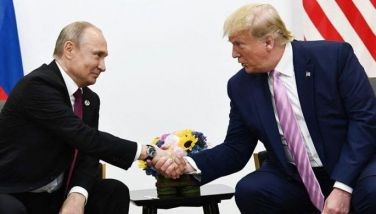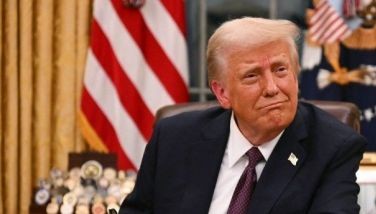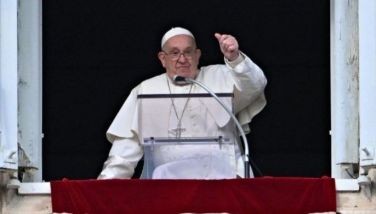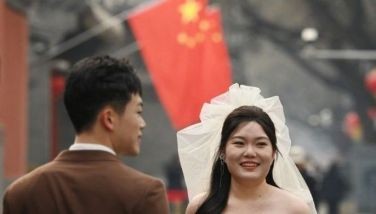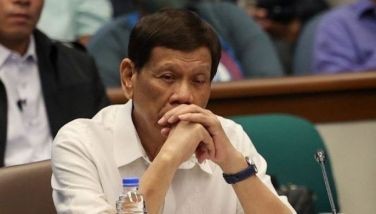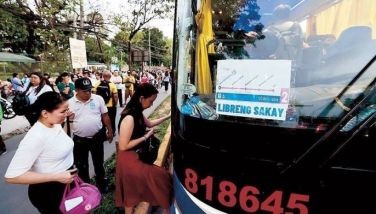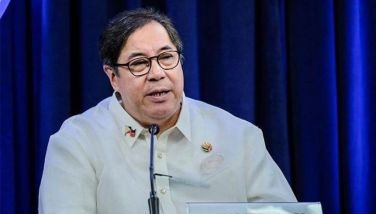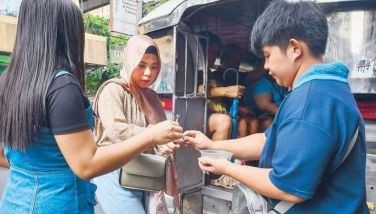Clash of values mires Thailand in cycle of coups
BANGKOK — Over the past decades, Chalad Worachat has resisted military regimes and dictatorial legislation by staging hunger strikes, five of them. Now the 71-year-old onetime parliamentarian is back on water and honey, despondent that after so many years and so much bloodshed, Thailand has been unable to break out of a cycle of military coups to achieve true democracy.
"We are not moving toward full democracy. We're going backward to dictatorship," he said on the 25th day of his sixth fast, which he vows to continue until the latest military regime adopts democratic principles. Sallow-faced and dressed in black, he reclined on a mat spread over a curbside across the street from the Parliament building, now empty.
Chalad has lain there before, sometimes to protest against individuals, at other times to stop moves like a 1983 bill that would have allowed unelected bureaucrats and military officers to become prime minister. But basically he has been fighting the same battle again and again.
"Thais have never learned about democracy, never really compared democracy with dictatorship to see which is better," he says. "They just look at what's in front of them and see a hero, but a hero never lasts long."
A military man has led Thailand for 54 of the 82 years since the Southeast Asian country ended absolute monarchy in 1932. It continues to bounce between coups and fragile democratic governments despite numerous advantages over many of its neighbors normally regarded as conducive to liberal democracy, including a vibrant economy, no rigid class structure and virtually no war on its soil in almost 250 years. This while once power-grabbing militaries have returned to their barracks in South Korea, Taiwan, Indonesia, the Philippines — even Myanmar to some extent.
At the heart of the instability is a clash of core values that has been with Thailand's constitutional monarchy from the beginning. The traditional Hindu-Buddhist culture — emphasizing deference to authority in a hierarchical system, acceptance of one's fate and avoidance of confrontation — runs against emerging individualism, egalitarianism and rule of law. The old values also breed power brokers who dole out rewards to subordinates whose loyalty flows to them rather than to state institutions.
"Patronage relations dominate all aspects of Thai society and have a crippling effect on democratic institutions and political culture," said Marc Saxer of the Friedrich-Ebert Stiftung, a German foundation promoting democracy. "Never mind the democratic facade, key decisions are made by a network of patrons in the backroom."
For more than a decade, Thai politics has been a bitter struggle between two sides that have both resorted to undemocratic means, leaving genuine democrats within all camps largely marginalized.
On one side are former Prime Minister Thaksin Shinawatra and his supporters, who have won every Thai election in the 21st century. Thaksin, now living in self-imposed exile in the United Arab Emirates to avoid a prison sentence for corruption, is popular among the rural poor but hated by many wealthier Thais for his winner-take-all methods.
As prime minister, Thaksin gutted agencies designed to curb executive power, stocked key positions with his relatives and attacked the media. The most recent elected government — led by his sister, Yingluck Shinawatra — began to crumble late last year after it tried to push through an amnesty bill that would have allowed Thaksin to return home.
The main opposition, the Democrat Party, has not won an election in more than 20 years but managed to gain power at times by siding with the traditional order. Yingluck's government was weakened by longtime Democrat leaders who orchestrated massive demonstrations, and by institutions widely regarded as lacking impartiality. Yingluck dissolved the House of Representatives and called for elections, but protesters blocked many polls and the Constitutional Court annulled the voting that did take place.
Coup leader Gen. Prayuth Chan-ocha, who took over May 22, said late Friday that general elections would be held around October 2015 after an appointed reform council and drafting committee write a long-term constitution. He has warned all groups not to oppose the military.
Even some who disagree with military intervention say that after six months of crippling political deadlock, an economic downturn and sometimes violent street demonstrations, Thailand had no Plan B on offer.
"It's deja vu. Times have changed, but we Thais have not yet found a way acceptable to most people to solve our political problems," said Sainarong Siripen Rasananda, a retired, Cambridge University-educated businessman.
Modern Thailand has gone through an astonishing 18 constitutions, none of which proved the hoped-for magic bullet. The argument goes that as long as traditional values dominate the country's elite, and thus underlie its key institutions, whatever legislated reforms are made are hardly worth the paper they're written on.
The 1932 rebellion left the old order largely intact, and the institutions created were top-down and heavily centralized. Political parties formed along patron lines, personalities and money, not ideology. Thailand was never colonized, and Western-style, democratic ways were not as deeply embedded as, for example, in India, where the British seeded the rule of law.
"The fundamental questions of politics have revolved around political status — how shall the rewards of goods, prestige and power be distributed within the ruling class?" wrote American political scientist David Wilson in 1962. Not much seems to have changed.
For decades authoritarian regimes, strongly backed by the United States in the 1950s and 60s, may have served the country well. With Thailand flourishing economically, and with some of the benefits trickling down to the rural poor, the impetus for change wasn't compelling.
An important factor is that for most of Thailand's modern history, King Bhumibol Adulyadej has been center stage. Now 86 and the world's longest reigning monarch, the king buttressed the then-fragile constitutional monarchy, garnering widespread respect and affection for his decades of labor on behalf of the poor, and for stepping in to halt bloodshed during several political crises.
"For many Thais, the monarchy evokes a stable social hierarchy in an increasingly unpredictable world," said Grant Evans, an Australian expert on Southeast Asia.
In recent years, some foreign and Thai scholars have, however, theorized that the monarchy has also held back democratic progress, either by the conservative nature of the institution itself, or because Thai people have looked on the king as a crutch, someone who will intervene to solve their critical problems. The king, who has been ailing for several years, formally endorsed the coup but otherwise has not publicly weighed in on recent political events.
These scholars describe a "network monarchy" — not a homogenous entity commanded by the king, but myriad groups with vested interests in a strong, enduring monarchy as a political and social institution. This network has tight, longstanding links to the army, elements of the bureaucracy and elite families, together forming a loose but formidable force.
"The fact is to build a democracy in the Western sense, you really need key institutions and their leaders to be behind it. And neither the military nor the palace have been behind it. Both see it as messy, ugly, ineffective and more corrupt than they might be themselves," said Paul Handley, author of a biography of the king which is banned in Thailand.
Indeed, Saxer and others describe Thai politics as rife with corruption, cronyism and vote-buying. "In the eyes of many these flaws of 'Thai-style democracy' have become synonymous with democracy. Accordingly the attitude of many Thais, particularly the Bangkok middle class, toward democracy is negative," Saxer said.
Charles Keyes, an American anthropologist who has studied Thai society for more than 50 years, said that "while the traditional value of hierarchy is still shared by the military and royalist elite, it is not shared either by the middle class or the rural people."
Middle-class Thais, however, have for now being aligned themselves with the old elite, even though they don't share the same values, Keyes said. He said two populist revolutions converged and then came into conflict: a middle class revolution that began in the 1970s with student protests, and a second based in the rural population that widely supported Thaksin's policies.
Thongchai Winichakul was one of those student leaders. He saw police kill his friends in a brutal 1976 crackdown, and was himself imprisoned for nearly two years. Now a professor of Southeast Asian history at the University of Wisconsin, he said that "what happened in Thailand now is anti-democracy, it's many steps backward."
He said there is a "deep structural conflict" that "cannot be solved by pushing the political system backward even further."
"Several values and ideology are very similar to 100-plus years ago: distrust in the people, trust in a virtuous elite, especially the king and his servants, including the military," Thongchai said.
Kim McQuay, head of the New York-based The Asia Foundation in Thailand, describes Thai political history as "one of forward and backward cycles rather than a steady progress toward democracy."
"After each coup, many Thais have seemingly acquiesced — perhaps naturally averse to confrontation — and a critical pro-democratic mass has yet to break the pattern," McQuay said. "While change is inevitable, I don't see Thailand breaking out of this unfortunate cycle in the foreseeable future."
- Latest
- Trending




















